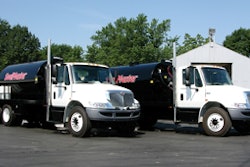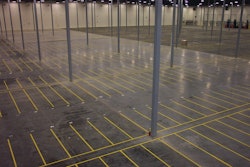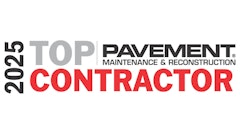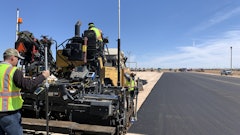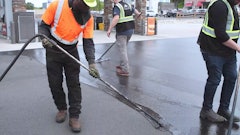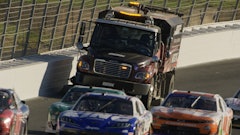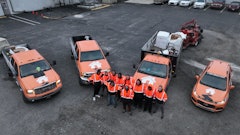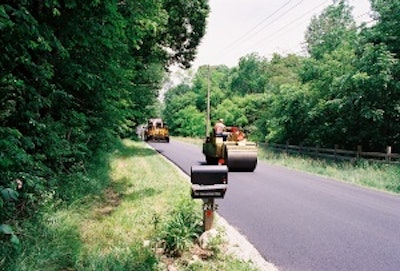
Indiana's Triangle Asphalt Paving has weathered tough economic times before and expects to weather the current economic situation. You can read more about how Triangle Asphalt succeeds in its day-to-day operations in the June/July issue of Pavement Maintenance & Reconstruction, but until that issue reaches your desk here are a few of the things the family-owned company is thinking about day to day.
1. Finding, training, and retaining qualified employees who are willing to work hard. Though they have a loyal and experienced crew, most of whom have been with the contractor for six to 20 years, Triangle Asphalt is constantly on the lookout for good people. Employees are found through references of current employees, family members of current employees, and advertising (though advertising has proved to be the least effective approach).
2. A reduced amount of work. Hit hard by increased fuel costs, a 90% price increase in the cost of liquid asphalt, and a 37% hike in HMA prices in one month of 2008 alone, paving not surprisingly slowed significantly by mid-summer last year. In fact, paving work for new construction in Triangle's market died almost completely. Where 95% of Triangle Asphalt's work in 2007 had been new construction - schools, city/county, and churches - that was not the case at all in 2008. And Steve Day says that by late June last year private overlay work was almost nonexistent.
3. Bottom-line profit as margins - the result primarily of increased fuel and HMA pricing - are thinner. A significant factor was increased fuel costs last year, which at least so far have eased a little in 2009. "The high cost of fuel just sucks the cash out of everything," Day says. And he means everything because that single cost affects every piece of equipment Triangle Asphalt (and every other contractor) operates, so any cost is multiplied across the entire fleet.
An example: Day says that from January 2008 through June 2008 the contractor's seven dump trucks burned $37,000 for fuel each month. "In 2007 that cost was about $17,000 a month so it's more than doubled and it just consumes your cash," he says.
But as important an impact as that fuel hike was this: The fuel suppliers started requiring payment immediately or very close to immediately. So where in the past fuel suppliers would allow Triangle to buy fuel, then bill the contractor, which would then pay the bill, Triangle had to come up with the cash immediately. "So cash flow was a lot tougher last year, mainly because of fuel costs and because the fuel suppliers want the money right away."
Day says unlike some pavers across the country who have inserted an escalator clause in contracts so the contract adjusts to the price of HMA, that's not possible when bidding county jobs. "Boone County just wants a firm bid. So you bid as tight as you can but you look out at the construction schedule and you try to push the schedule because then you can get closer to your price, and that can be the difference between a job and a profitable job," he says.
Yet while Day is concerned about margins, he's not all that concerned. Triangle Asphalt is obviously contending with the rise in HMA prices, but so is his competition. "The 2008 jump in HMA prices will weed out some of our competition I'm sure, just like it did in 2006," he says.
He says little has changed as far as competition over the past few years. "We run across the same seven people bidding on work as there've been. It's been that way for seven or eight years and it's the same people on every job."
"2008 wasn't as good as 2007 because of fuel and HMA costs," Day says, adding that 2009 is "somewhat better" than 2008. "But it's just a cycle. It's a down time and we're able to survive by maintaining. When times are good you control yourself and when times are bad you control yourself. Even when times are good enough to buy a $300,000 paver you have to make sure you can handle that paver and those payments should times get tough. I don't care what kind of technology is on that paver. It still takes someone to operate it, and you still have to have work for that paver to do."
Triangle Asphalt relies on day-to-day planning
Steve Day says because Triangle Asphalt Paving is a small contractor, and because they no longer produce their own mix, they put a lot of emphasis on planning and organization. They begin planning three weeks out for each job, then put a plan together for each week. The three-week plan is communicated to Milestone Construction, as is the one-week plan, and orders for HMA are placed by 2:00 p.m. the day before the mix is needed.
"This planning and scheduling is something we did before so it's really a carryover from when we produced our own mix," Day says. "When you have two crews you have to be careful scheduling bids. At one point we had 11 jobs ongoing with two crews, and trying to get all that done on time and beating the weather was tough, so you have to be careful."
Read more about Triangle Asphalt Paving in the June/July issue of Pavement Maintenance & Reconstruction Magazine.






